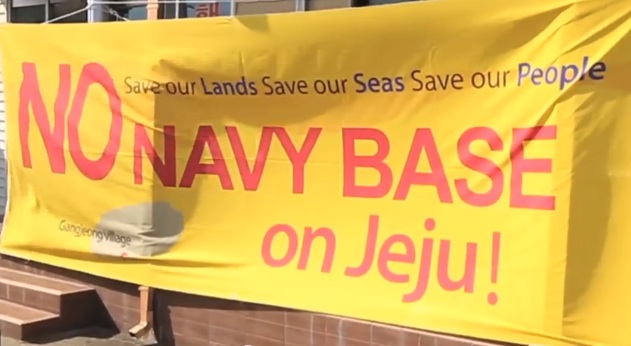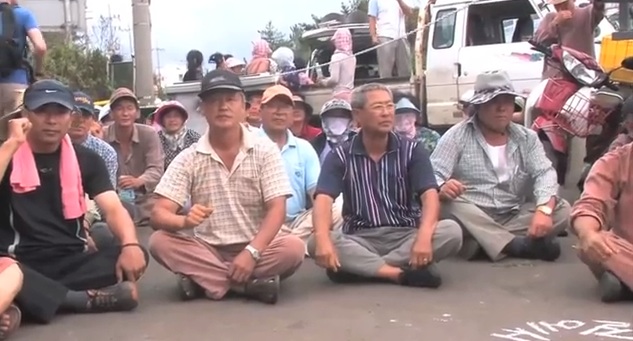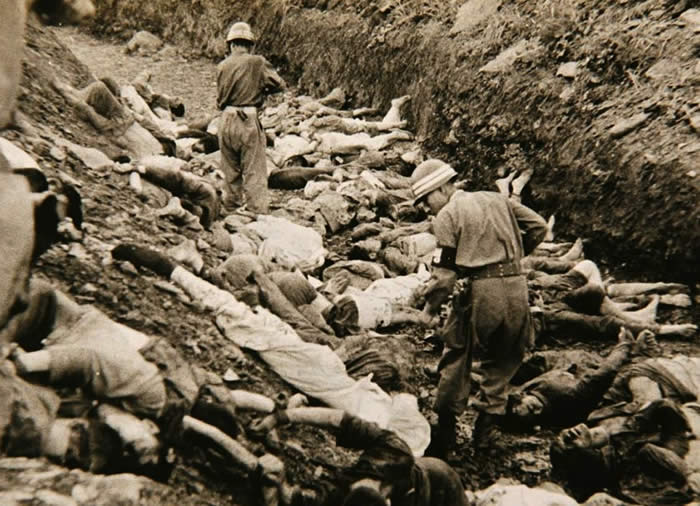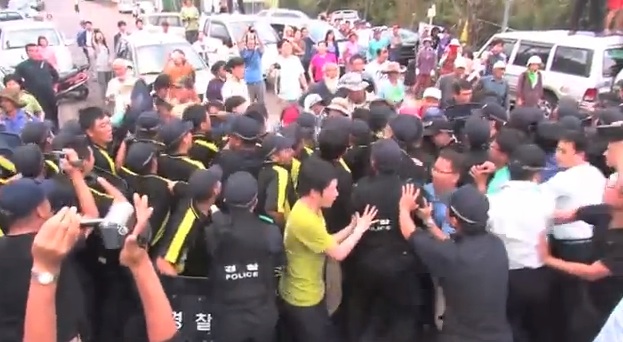RESISTANCE CINEMA
Presents
“THE GHOSTS OF JEJU”
Pax Tibi Productions, Written and Produced by REGIS TREMBLAY (2013, 80 min)
WHEN: Sunday march 16, 2014 1:15pm
WHERE: Community Church NY Gallery Room, 28 East 35th St. btwn Park & Madison Aves.
ADMISSION: Free, donations appreciated
Concluding our Winter schedule we turn to Asia, South Korea in particular, and a story that is little known in the U.S. To describe the film we allow the filmmaker Regis Tremblay to speak for himself.
 I am a filmmaker living in Woolwich, Maine. In September 2012, I spent a month in Korea and three weeks in tiny Gangjeong Village. Little did I realize what I stumbled into. Against the will of the residents of Gangjeong (pop. 1800) who are mostly fishermen and farmers, the Korean government and Navy began building a massive naval base to accommodate America’s military pivot to Asia.
I am a filmmaker living in Woolwich, Maine. In September 2012, I spent a month in Korea and three weeks in tiny Gangjeong Village. Little did I realize what I stumbled into. Against the will of the residents of Gangjeong (pop. 1800) who are mostly fishermen and farmers, the Korean government and Navy began building a massive naval base to accommodate America’s military pivot to Asia.
The villagers and their peace worker supporters have been protesting the construction of the base 24 hours a day, 7 days a week for five years. Not only are they fighting to save their village, but the entire ecosystem of the area which has been declared a positively no construction zone and a UNESCO Biosphere preserve. Also threatened are the Idio-Korean bottle nose dolphins, rare and endangered crabs and frogs, and the fresh-water shrimp that exist only in this village.
hours a day, 7 days a week for five years. Not only are they fighting to save their village, but the entire ecosystem of the area which has been declared a positively no construction zone and a UNESCO Biosphere preserve. Also threatened are the Idio-Korean bottle nose dolphins, rare and endangered crabs and frogs, and the fresh-water shrimp that exist only in this village.
 Compared to the relatively short-lived Occupy demonstrations in the States, I wondered what had sustained these brave, peaceful people for five years when they have been subjected to the brutal repression of hundreds of police and security guards. What I didn’t learn in my history classes was the role the U.S. Army played in the massacre of as many as 60,000 peasants on Jeju from 1948-1951. Because these fiercely independent people rebelled against the American occupation and the imposition of Sigman Rhee, a brutal dictator, they were labeled Communists.
Compared to the relatively short-lived Occupy demonstrations in the States, I wondered what had sustained these brave, peaceful people for five years when they have been subjected to the brutal repression of hundreds of police and security guards. What I didn’t learn in my history classes was the role the U.S. Army played in the massacre of as many as 60,000 peasants on Jeju from 1948-1951. Because these fiercely independent people rebelled against the American occupation and the imposition of Sigman Rhee, a brutal dictator, they were labeled Communists.
Recently revealed secret and classified documents, film and photos prove that the Americans equipped the Korean army and police, trained them, provided intelligence, and planned and directed the Scorched Earth assault on these innocent men, women and children.
Korean army and police, trained them, provided intelligence, and planned and directed the Scorched Earth assault on these innocent men, women and children.
Only after visiting the Peace Museum on Jeju commemorating the massacre which began on April 3, 1948, did I understand the meaning of the protest and the perseverance and resolve of the people of  Gangjeong and their supporters, many of whom survived the massacre and the others are immediate descendants of that horrific period. Then, as now, the people of Jeju are fighting for self-determination, basic human rights, an open and transparent democratic process, and the protection of this rare and beautiful environment.
Gangjeong and their supporters, many of whom survived the massacre and the others are immediate descendants of that horrific period. Then, as now, the people of Jeju are fighting for self-determination, basic human rights, an open and transparent democratic process, and the protection of this rare and beautiful environment.
My film places the 5-year old struggle in the context of America’s global military imperial domination of the planet through unrestrained and overwhelming force. Once again, the people of Jeju find themselves in the cross hairs of war between more powerful empires. And yet, the indomitable spirit of the Villagers and their supporters, who have not lost hope in spite of overwhelming odds, will inspire and motivate everyone who believes there is a better way to live together on this planet.

Regis Tremblay